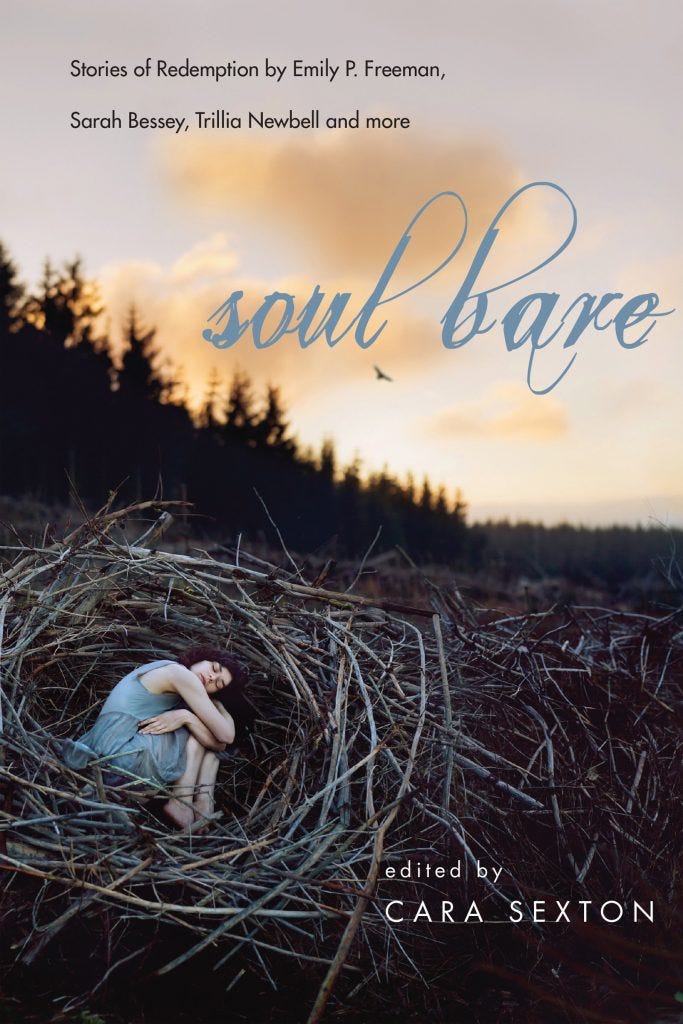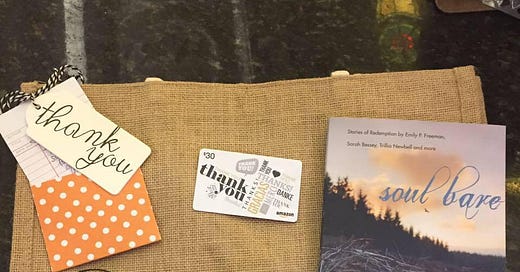Soul Bare Interview: How an Affair Laid My Soul Bare with Serena Woods
I hope you've been paying attention to some of the fabulous writers we're featuring in a few Saturday interviews this month! Today, Serena Woods is sharing with us about her essay in Soul Bare. (If you missed out, make sure you catch up and read our interview with Cara Sexton and Jennifer Camp). Serena tells a powerful story about adoption,legalism, an affair, and finding grace. Read on for more and make sure you grab a copy of Soul Bare. --AH

You write about your troubled childhood, adoption into a legalistic family, and an affair in your essay in Soul Bare. It's a powerful story of loss and redemption. How did these events lay your soul bare? Where are you today?
In order for something to be bared, it has to first be covered. My childhood and my experience with the legalistic side of religion necessitated the creation of a cocoon. It was in an attempt to protect myself from the environmental dangers of being a neglected child, and later to shield me from the constant disapproval of religion. My childhood engrained a deep and lingering distrust for people. It also lent the opportunity to hone a sharp sense of discernment. Legalism felt like being a chained animal under a relentless spotlight. For an extreme introvert, the inability to find solitude was torture. But, the mind is resourceful. I learned how to create my own mental world and carve spaces of peace deep within myself.
Adopting the Christian lifestyle was my attempt to find hope. I think that becoming part of a body of people who are all doing the same thing, looking in the same direction, and relish a great conversion story was good for me at that particular time in my life. I was nineteen, homeless, and pregnant. I enjoyed the structure, the social aspect, and the personal challenge of changing my life. I didn’t realize that my belief system was built on the foundation of my own ability to not mess up. I felt like I entered the scene with a clean slate and all I had to do was maintain it. I wasn’t scared of God’s disapproval; I had a very sweet relationship with Him. I believed that He saw me as innocent and all I wanted was to make Him proud of me. I never let Him into the spaces of peace deep within, and I rarely visited them myself. My past was buried and I was a new creation.
My affair is what bared my soul. I can’t begin to describe how terrifying it was to be broken open like that. All my pieces unprotected and out in the open… My childhood, the feelings of disapproval… Only this time the disapproval was warranted. I was led to believe that you have one shot with God and you’re on your own if you ruin that. As I was coming to terms with the reality of a future without God, I made a first and last attempt to hear from Him. I hadn’t spoken to Him since my affair began. There I was, roughly three months post destruction and about ten weeks pregnant, praying: “God, I know what your people say about me, and I know what I say about me, but I need to know what you say about me.”
I was expecting His disapproval and dismissal, but I found the exact opposite. As I searched the scriptures and opened myself up for the death sentence, He taught me the Gospel. I was looking for the scriptures to back up the condemnation and I never found them. I couldn’t understand why His people were guarding His cross from those who needed to be washed by His blood. It was confusing to me, but I was spiritually waking up. Their behavior was clearly an act of unbelief and misunderstanding. This realization was an invitation to purpose. I thought that if people knew the “scandal” of the Gospel, that they would find freedom, know how to forgive, and know how to lead others to the open spaces of grace.
I wasn’t prepared for the resistance I met. People, especially when they think they’ve got it figured out, don’t like to question themselves. It’s been eleven years and my purpose remains. I continue to work on my ability to articulate the mysteries of grace as they’re revealed. I’m very private, and still have spaces of peace deep within, but I am no longer alone in them.

You write that the "towers of joy" are dependent on the "canyons of sorrow" in the Christian life. Can you walk us through this a bit?
I don’t think this philosophy is isolated to the Christian life. I think that the capacity for joy directly correlates with the capacity for sorrow in any life. When you open yourself with the intent of filling your heart with love, you are also opening yourself to the unintended possibility of filling your heart with hurt. When pain carves grooves into your soul as it scratches canyons down the corridors of your life, it’s creating space that wasn’t already there. When love burrows into your depths and stretches out in the hammock of your soul, it’s also creating the hollows that pain fills when love leaves. Towers of joy are dependent on the canyons of sorrow because they’re different sides of the same coin.
You write I believed in Jesus in general, but not that he was for me. What advice would you have for those who share that same view?
It’s our memory that’s the problem. We know how we justified our behavior. We know our own blatant disregard for right so that we could selfishly and consciously choose what we knew was wrong. That’s the aspect that keeps us from believing that Jesus would forgive us. You have to dump your bag of beliefs out on the table and sift through them every once in a while. For whatever reason, we carry around this cheap belief that God only forgives the innocent and the grace of Jesus is reserved for those who don’t need it.
My advice is to actually consider the life of Jesus, the people He spent His time with, the people He actually got frustrated with, and the barbaric way in which he allowed Himself to die. Nothing about Him is congruent with the disapproving and exclusive light He’s often cast in. If it is, it’s in favor of the outsiders. He’s the refuge of the shunned and the friend of the hated. If you’re sitting in your own aftermath and feeling like you’ve done the unforgivable, hear Him tell you what He told me. “This is why I came.”

"Your failure is not an accident. God planned for it. The plan's name is Jesus." You write how in your failure you experienced the scandalizing message of grace and it turned off people because it seemed too good. For those with a pretty clean-looking story, how can they experience the same grace in their failure as you have?
Grace is a highly misunderstood concept and it doesn’t help when the word is as loosely used as it is. I wrote my best answer to this question in my book, Grace Is For Sinners. When someone messes up, to whatever degree, there is never a question of fault. Each person is responsible for his or her own behavior. I need to make this clear because a dichotomy exists that flips this inside out and confuses some. It is when you, through faith, submit yourself, sin and all, to God, that you enter the reality of grace. Grace gives purpose to the failure that was previously unknown. The sinner cannot take credit for the good, but is a recipient of the good. When they grasp this directional pivot they are experiencing repentance, and then freedom (2 Corinthians 7:10).
The best illustration for this is what Joseph’s brothers experienced. What they intended for evil, God used for good. By grace, they entered into a reality where their sin was used to save their lives. They can’t take credit for the good and if they don’t accept that change of direction, they will forever live in fear and guilt, even to the point of denying themselves the good. They won’t be free. Repentance is a change of direction; it’s the pivot to freedom.
Nobody’s story is clean enough. Law is Law and sin is sin. If you live by any of the Law, you have to live by all of the Law. Read Galantians 3. No one is justified by his or her own cleanliness. As a matter of fact, a life lived apart from grace is a life cursed. It is clearly established that this is impossible to get it right, proven by the necessity of Jesus. He didn’t come for just the morally weak. He came for everybody. Some of the ugliest pride hides under the prettiest façade, but the veneer doesn’t hold up under the heat. Don’t ever make the mistake of thinking someone has it more together than you. It’s better to know your sin than to have pride dressed up as righteousness.
What is your hope for your words, your story, and ultimately for Soul Bare?
My hope for my words is to offer a different perspective and stir a curiosity in someone to the point of them doing a little digging into the scriptures on their own. Reading the Bible was never as exciting to me as when I tried to find evidence for my condemnation. Exciting is a weird word, but what I mean is that I found the complete opposite and much, much more. I think coming at it form that angle removed the glaze of religious monotony enough for me to find the craziest stuff.
As for my hope for my story, I just don’t want anyone in a similar situation to feel alone. Sharing my story is the equivalent of leaving little notes along a lonely hiking trail for whoever comes behind me. Things like, “this is the hardest part of this path”, or “look in this tree, there’s usually some fruit growing” …things like that.
My hope for Soul Bare is for there to be enough diversity in experience, perspective, and style for pretty much anyone to be able to connect and find something helpful. I’m happy to be a part of filling this gap on the bookstore shelves. People are looking for a Godly perspective for their confusing and painful situations. This is an easy choice because it’s 31 different stories pointing in the same direction.
A bit more about Serena:
Serena is a thinker who writes for various publications, on and offline. Her book, Grace Is For Sinners, is an uncensored glimpse of her experience with God’s grace. Since publishing her first book, she has earned a Bachelor of Science in Psychology, become an occasional and somewhat reluctant domestic and international public speaker, and started a few more books that she’ll finish eventually. Serena is a homebody who lives in Southern Missouri where she and her husband, Justin, are raising their four daughters. Their beloved Boxers, Nigel and Oscar, are the reason they don’t have nice furniture. Serena is an eternal advocate for the broken, rejected, and ugly. She writes her argument for the gospel at graceisforsinners.com.




